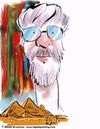William Stucke: Difference between revisions
Nowheregirl (talk | contribs) No edit summary |
No edit summary |
||
| Line 10: | Line 10: | ||
}} | }} | ||
William Stucke is the Councillor at | William Stucke is the Councillor at the Independent Communications Authority of South Africa, [[ICASA]]. He was born in Kimberley, South Africa, and was educated in RSA, Malaysia and the UK. He worked in London in the telecommunications industry before returning to South Africa in 1984, when he joined the Anglo American / De Beers Group. <ref>[http://www.ispa.org.za/office-bearers/william-stucke ISPA.org]</ref> | ||
He programmed his first computer in 1972, and in 1987 he built his first underground fibre-optic and "leaky feeder" wireless networks. In 1996, he started an ISP, [[ZAnet]] and became a pioneer in South African IT. <ref>[http://za.linkedin.com/in/williamstucke linkedin]</ref> | |||
He has regularly consulted | He has regularly been consulted regarding IT matters; including policy, telecommunications and wireless issues. He is the former chair of [[AfrISPA]], and also of [[ISOC-ZA]], and the former treasurer of [[ISPA]]. | ||
William was co-Component Leader of the AfrISPA portion of the CATIA programme, which helped to more than double the number of IXPs and ISPAs in Africa. He has given presentations at a number of local and international conferences, and presented at training workshops around Africa. | He is reknowned for being an agitator and public speaker for telecommunication liberalisation in Africa. He has written a number of papers on the internet industry, peering, deregulation and legislation, and has played an active role in the Telecommunications Symposium, E-commerce Debate and the Convergence Bill processes, which lead to the Telecommunications Amendment Act (2001), the ECT Act (2002), and the ECA (2005), respectively. | ||
William was co-Component Leader of the [[AfrISPA]] portion of the CATIA programme, which helped to more than double the number of IXPs and ISPAs in Africa. He has given presentations at a number of local and international conferences, and presented at training workshops around Africa. | |||
==Career History== | ==Career History== | ||
Revision as of 18:06, 10 January 2011
 |
 |
| Country: | South Africa |
| LinkedIn: |
William Stucke is the Councillor at the Independent Communications Authority of South Africa, ICASA. He was born in Kimberley, South Africa, and was educated in RSA, Malaysia and the UK. He worked in London in the telecommunications industry before returning to South Africa in 1984, when he joined the Anglo American / De Beers Group. [1]
He programmed his first computer in 1972, and in 1987 he built his first underground fibre-optic and "leaky feeder" wireless networks. In 1996, he started an ISP, ZAnet and became a pioneer in South African IT. [2]
He has regularly been consulted regarding IT matters; including policy, telecommunications and wireless issues. He is the former chair of AfrISPA, and also of ISOC-ZA, and the former treasurer of ISPA.
He is reknowned for being an agitator and public speaker for telecommunication liberalisation in Africa. He has written a number of papers on the internet industry, peering, deregulation and legislation, and has played an active role in the Telecommunications Symposium, E-commerce Debate and the Convergence Bill processes, which lead to the Telecommunications Amendment Act (2001), the ECT Act (2002), and the ECA (2005), respectively.
William was co-Component Leader of the AfrISPA portion of the CATIA programme, which helped to more than double the number of IXPs and ISPAs in Africa. He has given presentations at a number of local and international conferences, and presented at training workshops around Africa.
Career History[edit | edit source]
- From April 1982 — December 1983 he worked as Hardware Designer at Small Systems Engineering / National Telephone Systems
- From January 1984 to January 1987 he was the Project Engineer at Western Deep Levels.
- He worked as the CI & Engineer at De Beers - Finsch Mine from 1987 to January 1990
- From February 1990 to 1993, he worked in De Beers - Premier Mine as a Project Engineer (C&I).
- From 1993 to 1998, he worked as the Principal C&I Engineer De Beers Research Laboratory.
- From 1998 to 2001, He was Chairman of AfrISPA. He actively participated in the foundaction process of this organisation.
- From October 1996 to September 2007 he was the Managing Director of ZAnet Internet Services.
- From 2000 to October 2009 he was the Treasurer of ISPA.
- He was the director of Director of QuickStep 691 from October 2007 to October 2009.
- He served as the Chairman of AfrISPA from August 2001 to March 2010.
- He served as the Chairman of AfrISPA from August 2001 to March 2010.
- He was selected as the ICASA councilor in October 2009. [3]
